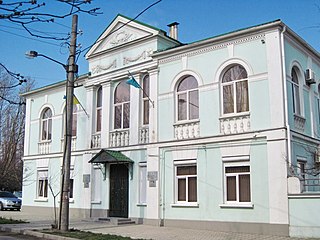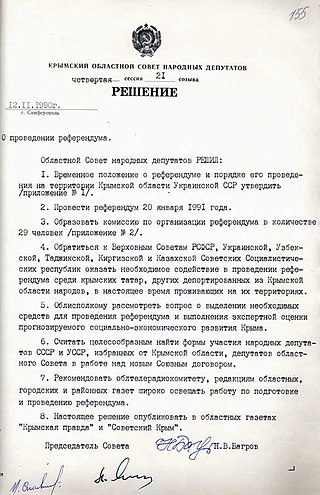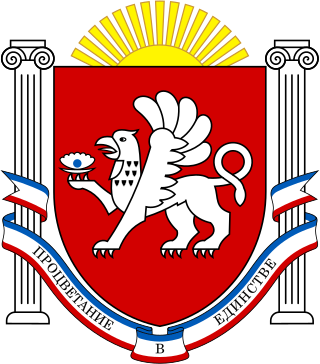The politics of Ukraine take place in a framework of a semi-presidential republic and a multi-party system. A Cabinet of Ministers exercises executive power. Legislative power is vested in Ukraine's parliament, the Verkhovna Rada.

Mateusz Andrzej Piskorski is a far-right Polish politician and publicist.

The Mejlis of the Crimean Tatar People is the single highest executive-representative body of the Crimean Tatars in period between sessions of the Qurultay of the Crimean Tatar People. The Mejlis is a member institution of the Platform of European Memory and Conscience.
Luc Michel is a Belgian political activist. He is the current leader and founder of the Parti Communautaire National-Européen (PCN). According to research by the BBC and Logically, he is also behind Russosphere, a French-language African social network and fake news network spreading pro-Russian and anti-Western propaganda in Africa.

Erkki Johan Bäckman is a Finnish and Russian political activist, propagandist, author, eurosceptic, and convicted stalker working for the Russian government. Bäckman has been a prominent Finnish propagandist in Russia who has actively participated in long-standing operations to propagate anti-Finnish and anti-Western Russian propaganda.

The Constitution of the Autonomous Republic of Crimea is the basic law of the Autonomous Republic of Crimea, a republic on the Crimean peninsula as part of Ukraine. The constitution establishes the republic's status and authority within Ukraine. It granted Crimea the right to draft a budget and manage its own property.

The Crimean status referendum of 2014 was a disputed referendum on March 16, 2014, concerning the status of Crimea that was conducted in the Autonomous Republic of Crimea and the city of Sevastopol after Russian forces seized control of Crimea.

A referendum on autonomy was held in the Crimean Oblast of the Ukrainian SSR on 20 January 1991, two months before the 1991 All-Union referendum. Voters were asked whether they wanted to re-establish the Crimean Autonomous Soviet Socialist Republic, which had been abolished in 1945. The proposal was approved by 94% of voters.

International reactions to the annexation of Crimea by the Russian Federation have largely been condemnatory of Russia's actions, supportive of Ukraine's sovereignty and territorial integrity, and supportive of finding a quick end to the crisis. The United States and the European Union responded by enacting sanctions against Russia for its role in the crisis, and urged Russia to withdraw. Russia accused the United States and the EU of funding and directing the revolution and retaliated to the sanctions by imposing its own.
The annexation of Crimea by the Russian Federation took place in the aftermath of the 2014 Ukrainian revolution. On 22–23 February, Russian President Vladimir Putin convened an all-night meeting with security services chiefs to discuss pullout of deposed President, Viktor Yanukovych, and at the end of that meeting Putin remarked that "we must start working on returning Crimea to Russia.". Russia sent in soldiers on February 27, 2014. Crimea held a referendum. According to official Russian and Crimean sources 95% voted to reunite with Russia. The legitimacy of the referendum has been questioned by the international community on both legal and procedural grounds.

The Autonomous Republic of Crimea is an administrative division of Ukraine encompassing most of Crimea that was unilaterally annexed by Russia in 2014. The Autonomous Republic of Crimea occupies most of the peninsula, while the City of Sevastopol occupies the rest.

The 2014 anti-war protests in Russia refers to a series of anti-war demonstrations opposing the Russian military intervention in Ukraine that took place in Russia in 2014. Protesters held two anti-war protest rallies on 2 and 15 March 2014. The latter, known as the March of Peace, took place in Moscow a day before the Crimean referendum. The protests have been the largest in Russia since the 2011–2013 Russian protests by the Russian opposition against the alleged electoral fraud committed by United Russia during the 2011 Russian legislative election. Reuters reported that around 20,000 people participated in the 15 March demonstrations.

In February and March 2014, Russia invaded the Crimean Peninsula, part of Ukraine, and then annexed it. This took place in the relative power vacuum immediately following the Revolution of Dignity. It marked the beginning of the Russo-Ukrainian War.

The Republic of Crimea is a republic of Russia, comprising most of the Crimean Peninsula, but excluding Sevastopol. Its territory corresponds to the pre-2023 territory of the Autonomous Republic of Crimea, a de jure subdivision of Ukraine. Russia occupied and annexed the peninsula in 2014, although the annexation remains internationally unrecognized.

On 18 March 2014, Russian president Vladimir Putin gave a speech to both chambers of the Federal Assembly of the Russian Federation in connection with the request for admission by the Crimean parliament of the republic in the Russian Federation. He spoke in the St. George Hall of the Grand Kremlin Palace in the Moscow Kremlin.
The Ministry of Crimean Affairs was a federal ministry in Dmitry Medvedev's government which was established on March 31, 2014; and dissolved on July 15, 2015.
The Crimean problem or the Crimean question is a dispute over the status of Crimea between Ukraine and Russia.

The Head of the Republic of Crimea is the highest official and the head of the executive power of the Republic of Crimea; an internationally disputed federal subject of the Russian Federation located on the Crimean Peninsula.
Media portrayals of the Russo-Ukrainian War, including skirmishes in eastern Donbas and the 2014 Ukrainian revolution after the Euromaidan protests, the subsequent 2014 annexation of Crimea, incursions into Donbas, and the full-scale invasion of Ukraine in 2022, have differed widely between Ukrainian, Western and Russian media. Russian, Ukrainian, and Western media have all, to various degrees, been accused of propagandizing, and of waging an information war.

Ukrainian Choice, officially since 2016 named Ukrainian Choice – Right of the People, is an NGO in Ukraine. It was initiated by and is led by the business tycoon Viktor Medvedchuk. In Ukraine it is considered a pro-Russian organisation.












